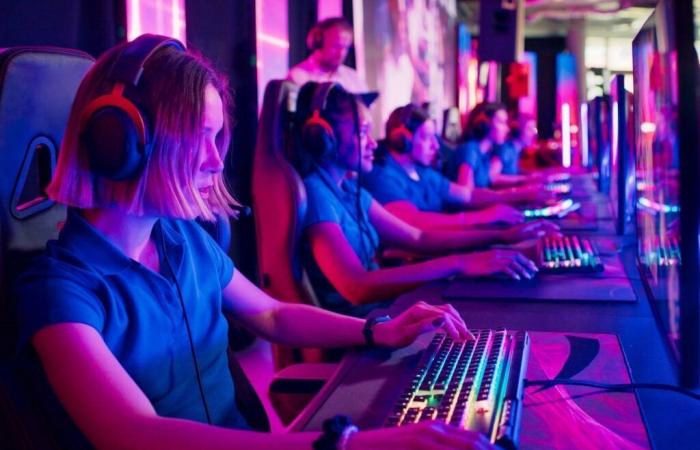In terms of atmosphere, major e-sport competitions have nothing to envy of those of a Football match! No stadium, but a central podium where players – called gamers – control their avatar or their vehicle, controller in hand, headphones on their ears. Excited spectators fill the stands, their eyes glued to giant screens where they can follow the participants’ strategies. Depending on the games, we compete in combat (on League of Legends, Street Fighter, etc.), in shooting (on Valorant or Counter Strike) or in a mix of football and car racing like on Rocket League. But who says electronic sport does not necessarily mean face-to-face. Alone or in a team, you can compete remotely over the Internet. We’re a long way from Nintendo evenings with friends, with a drink and some chips…
Also discover: What careers for a video game fan
A real social phenomenon
With the emergence of Twitch, the YouTube of live e-sport, electronic sport has become a real social phenomenon. The main tournaments are now broadcast online and we are witnessing a democratization of their practice. According to the France Esports 2023 barometer, our country has 2.3 million amateur e-sports enthusiasts (having participated in at least one organized competition), or as many as members of the French Football Federation. To which are added 3.7 million recreational e-sports players (games with ranking, outside competition) and 7.8 million “general public” players (without ranking, without competition). E-sport today has a real reach among 15-34 year olds, especially men. There are even professional e-sports enthusiasts (nearly 300 in France), known by their pseudonym, like ZywOo for Mathieu Herbaut. These new stars attract real fans – communities. As a result, no less than 10 million French people watched a competition in 2023.
Soon the Olympics…
Since electronic sports are generally practiced seated, they do not respond to public health messages on the theme “Eat Move”! In addition, video games – and their rules – being the intellectual property of their publisher, there is no specific federation. As a result, there are no equivalents to federal doctors. “ However, for several years, e-sport clubs have been recruiting health personnel: sports and performance psychologists, physiotherapists and osteopaths, dieticians, physical trainers, etc. », observes Nicolas Besombes, researcher in sociology of e-sport and member of the board of directors of the France Esports association. Regardless, e-sport, like classic sport, most often requires great motor skills. It is also treated like any other discipline in the journalTeam since 2010. And, the icing on the cake, will be entitled to its first Olympic Games at the end of the year (in Saudi Arabia)!
“Actions that develop visual acuity and hand-eye coordination”
Greater responsiveness and dexterity
It seems like nothing, this activity has a number of health benefits. Concentrate on your character to make him catch balls, accelerate the pace, avoid pitfalls with your keyboard, controller or mouse… so many actions that develop visual acuity and hand-eye coordination. It has been shown that surgeons trained in shooting games, in which they see the action through the eyes of their avatar, become more skilled during their robot-assisted operations… “ With play, we improve our reactivity to a stimulus, as well as our fine motor skills. », Explains Pierre-Loup Loiseau, masseur-physiotherapist trained in e-sport, who supports gamers. Furthermore, and it is proven, e-sport allows an improvement in reading, learning foreign languages… but it also helps the most sensitive to make friends. “ We also develop our capacity for adaptation and organization because we must constantly review our strategy according to the evolution of the game. », adds the physiotherapist.
Also discover: According to a study, video games are good for children’s brains
Beware of a sedentary lifestyle and compulsive activity
Let’s not forget, training for an e-sport competition means sitting for a long time… or even lying in bed. Beware of the harms of a sedentary lifestyle, starting with weight gain (we burn few calories) and cardiovascular risks. Also beware of disruptions in sleep and eating behavior: players can enter a “timeless” spiral to the point of forgetting the natural sleep-wake rhythm and that of the three daily meals. And by typing on their keyboard and manipulating a console, they risk ending up with musculoskeletal disorders, in particular pain in the carpal tunnel and upper limbs. “ Some players also suffer from problems concentrating and managing emotions », adds Pierre-Loup Loiseau. Others develop a compulsive practice. Although it is not strictly speaking an addiction, the WHO has recognized since 2019 the existence of a “ video game disorder » which would affect 3.3% of e-sport practitioners.
Indispensable coach
Suffice to say that it is better, as with any sport, to be supervised by a coach. So, before starting, we warm up for a quarter of an hour. “ We mobilize the joints of the wrists, fingers, shoulders and neck, but also the eye muscles (we look far away then near, left then right). It is recommended to carry out a cardiovascular warm-up (for example, doing squats) to increase the heart rate, so that the muscles and the brain are better oxygenated. This is a way to improve the player’s abilities », explains the physiotherapist. Also important: allow breaks between games (which last five to forty minutes). “ It is advisable to stop for ten minutes to rest your ears and eyes. So we don’t look at our smartphone! » warns Pierre-Loup Loiseau. Controllers, yes… but in complete safety.
For seniors too
If e-sport is very successful with young people, certain games are suitable for older people. Called exergames (exercise games), they are even the subject of public health actions. Let’s mention the Seniors’ Trophy, on Switch Sports Bowling, organized by the Poitevin association Silver Geek.
Objective: limit the digital divide and loss of autonomy. Special sign: players preferably stand upright. This involves throwing a ball against a virtual wall, dancing while reproducing a choreography on the screen, etc., for example by mobilizing the shoulders and arms. We gain strength and endurance, and maintain muscle tone. These so-called “active” games also have cognitive benefits: we tend to adapt more quickly to new situations, to understand more quickly, etc.





